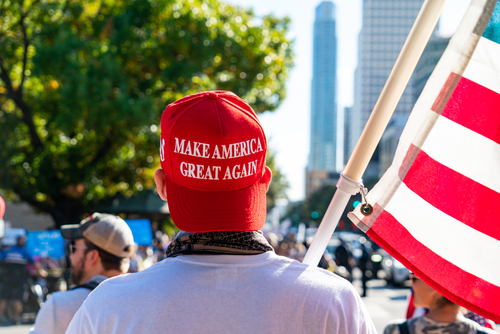A controversial advertisement in Washington D.C.’s transit system likening MAGA hat wearers to trash sparked a storm of political tension. The poster was falsely associated with local government programs, leading to swift backlash and efforts to rectify the situation, amid a climate of increasing political polarization.
Ad Campaign Controversy
An incendiary advertisement appeared in Washington D.C., equating supporters of Donald Trump depicted by a MAGA hat with trash. The ad featured the provocative message, “Keep DC trash free,” and showcased imagery connected to Project 2025. It misleadingly included symbols of the District of Columbia Department of Public Works and the Mayor’s Office of the Clean City.
The District Department of Transportation (DDOT DC) immediately addressed the issue, disowning any responsibility for the ad’s creation or distribution. “This image was not created, funded, or authorized by the DC government, and our teams are currently working to remove them,” a DDOT DC spokesperson declared. DDOT DC urged citizens to report any similar instances to 311 for prompt action.
🚨 The District Department of Transportation (DDOT) in Washington, D.C., is working to remove a controversial transit ad that equated MAGA hat wearers to garbage.
The ad, displayed near the Capitol, depicted a MAGA hat wearer holding a book titled "Project 2025" and included… pic.twitter.com/QRXPXLaclO
— Tony Lane 🇺🇸 (@TonyLaneNV) December 29, 2024
Political Reactions and Social Impact
The controversy extended beyond mere local governmental concerns. Mayor Muriel Bowser’s office redirected all queries to DDOT DC’s statements, leaving the task of untangling the political backlash to the agency. The identity of the ad’s creator remains unknown, echoing previous instances of similar misleading campaigns across the U.S., including one falsely suggesting endorsement of Vice President Kamala Harris by the Philadelphia Eagles.
The resurgence of such politically provocative ads heightens the nation’s sensitivity over political expression. During the 2024 election, President Biden faced criticism over comments perceived as derogatory toward Trump supporters, spurring further division. Controversially interpreted statements added fuel to public sentiment, necessitating official White House clarifications.
Can't believe I almost forgot this similar gem: did we ever get to the bottom of how fake Eagles ads endorsing Kamala were professionally installed at Philly bus stations magically without knowledge of the Eagles or SEPTA??? Supposedly ample CCTV footage didn't have any hints? https://t.co/JCSrWq4fAQ pic.twitter.com/Pldd15cJgY
— Kush Desai (@K_SDesai) December 29, 2024
Navigating Political Division
Incidents like these in Washington D.C. highlight a deeper narrative of ongoing political strife. President Biden’s attempts to clarify his contentious remarks by distinguishing the rhetorical supporters from the entire group of Trump backers didn’t seem to quell all outrage. The division persisted, with figures like Trump retaliating in their unique styles, as evidenced by his curious photo in a garbage truck.
This episode, alongside similar controversies, underscores the challenges in handling political discourse and public expression. In an era marked by stark political alliances and discordant public opinion, incidents such as these reinforce the need for considered responses to influence the narrative constructively.

